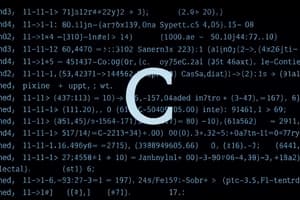Podcast
Questions and Answers
What is an expression in C?
What is an expression in C?
A combination of variables, constants, and operators.
In the statement variable = expression;, the expression is evaluated first and then the previous value of the variable on the left is replaced. The operators like =, +=, -=, *=, /=, and %= are always applied last in an expression.
In the statement variable = expression;, the expression is evaluated first and then the previous value of the variable on the left is replaced. The operators like =, +=, -=, *=, /=, and %= are always applied last in an expression.
True
Which operator has the highest precedence in C?
Which operator has the highest precedence in C?
- Multiplication
- Logical AND
- Parentheses (correct)
- Assignment
What does the operator && represent?
What does the operator && represent?
The expression 8 < 3 evaluates to true.
The expression 8 < 3 evaluates to true.
The sizeof operator in C is used to determine the size of a variable in bytes.
The sizeof operator in C is used to determine the size of a variable in bytes.
Match the following operators with their functions:
Match the following operators with their functions:
Flashcards are hidden until you start studying
Study Notes
Expressions
- An expression is a combination of variables, constants, and operators.
- Expressions are written according to the syntax of the C language.
- In a statement,
variable = expression;, the expression is evaluated first, and then the previous value of the variable on the left is replaced. - Operators like
=,+=,-=,*=,/=, and%=are always applied last in an expression.
Operator Precedence
- Operator precedence defines the order in which operators are evaluated in an expression.
- The priority of operators indicates the order of evaluation, with higher priority operators being evaluated first.
- Parentheses
(), brackets[], and member selection (->) have the highest precedence. - Unary operators like
++,--,+,-,!,~,*,&, andsizeofhave higher precedence than binary operators. - Multiplication, division, and modulus (
*,/,%) have higher precedence than addition and subtraction (+,-). - Bitwise operators have lower precedence than arithmetic operators.
- Logical operators like
&&,||, and?:have lower precedence than bitwise operators. - Assignment operators like
=,+=,-=,*=,/=,%=,&=,^=,|=,<<=,>>=have the lowest precedence.
References
- Tan, H.H., and T.B.D’Orazio.C Programming for Engineering & Computer Science.USA: WCB McGraw-Hill. 1999.Print.
- Tutorialspoint.com."C Operators." Www.tutorialspoint.com.N.p., n.d.Web. 01 Feb. 2017..
- "C Programming Operators." C Operators: Arithmetic, Logical, Conditional and more.N.p., n.d.Web. 01 Feb. 2017..
- Rajinikanth."C Programming Language." C Operators | c operators | operators in c | C by Rajinikanth | C Programming Language.N.p., n.d.Web. 09 Feb. 2017..
Studying That Suits You
Use AI to generate personalized quizzes and flashcards to suit your learning preferences.




